Ridley Scott Talks Prometheus With SlashGear: Candid & Uncut
Director Ridley Scott is a man who needs little introduction: the genius behind Gladiator, the original Alien and, of course, Prometheus. SlashGear sat down with Scott – along with Prometheus writer Damon Lindelof – shortly after the movie's worldwide premiere, to talk director's cuts, the difficult balance of religion and science, and to find out about "The F*cking Cappuccino Theory of Astrophysics."
Scott arguably gave the sci-fi-horror genre its flagship vehicle in the form of the first Alien film, kick-starting a box office busting Quadrilogy and coining the phrase "In space, no one can hear you scream." Since its 1979 release the screams have come thick and fast, Prometheus seeing Scott's much-anticipated return to science-fiction filmmaking and with a considerably increased budget – and equally huge expectations – so as to, as the blunt director said at the premiere, "make you sh*t yourselves."
SPOILER WARNING: some of Ridley Scott and Damon Lindelof's comments concern specific plot points in Prometheus. If you want to save every surprise and theme until you've seen the movie, bookmark this and come back after you've been to the theater!
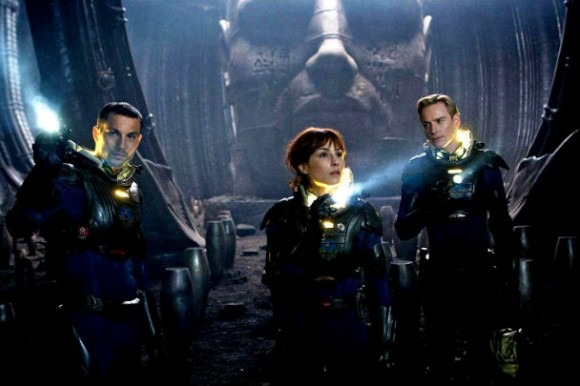
[Question] You're known for releasing a director's cut. Are we going to see a Prometheus director's cut when this comes to DVD?
[Ridley Scott] No, I think this is a good length. But that said, I think that now the fashion of actually putting out a couple of discs is here to stay, which will comfort you on all other kinds of conversation about how the movie was made. All you'll really do is see extended scenes in the menu. Other that that I think this is a pretty good length, the dynamics are about right.
The one, the only real regret I've ever had over the years, funnily enough, is the cut on Kingdom of Heaven. I removed 17 minutes which I thought at the end of the day were emotionally essential. They weren't really part of the narrative, which was the problem, and when you're editing, you're editing and then suddenly the film goes off on a tangent for 17 minutes, and you've seen the joke several times, so the joke's no longer funny or interesting. And it was wrong, really, to take it out, because it was all about the demise of the young king, and therefore it was also a very nice thing for Eva Green. I always regretted that. The three hour version of that was somehow more complete.
[Q] With the secrecy surrounding this, which leads to all the speculation and things like that, do you have a favorite rumor that popped up over the time that made you laugh? Now that the movie's hitting theaters and things like that, it's got to be kind of funny to see all these things come up online, or come up in the news, and think "that's so far off!"
[RS] No, I mean, we anticipated that there might be... I mean, because the film was so important thirty years ago, we knew that when we started doing the movie it's going to create some definite groundswell. And therefore you want to be secretive, because, I mean why do you want to know the play before you see the play? So that was all kind of fairly logical and pretty easy to control. Today, if I hand you a script, your name's going to be right across every page, so if it comes out and your page is there, you're going to get your knees whacked in the carpark.
[Damon Lindelof] That's not a euphamism!
[aquote]We anticipated rumors rather than closing them down[/aquote]
[RS] We don't f*ck about. And then, you know, okay. The thing about it, I think we also were pretty professional at anticipation, and rather than putting out the usual form of advertising – because I'm deeply entrenched in advertising still – we started thinking we should be using viral TV and viral Twitter. There's all those people Twitter, and if we put out stuff that doesn't mention the movie, that's going to be really interesting, and all Twitter's going to go "what the... agghhh?!" And then suddenly some bright spark goes "wait a minute, biking! Weyland Yutani!" and then you're off and running. So that, we anticipated stuff rather than closing it down.
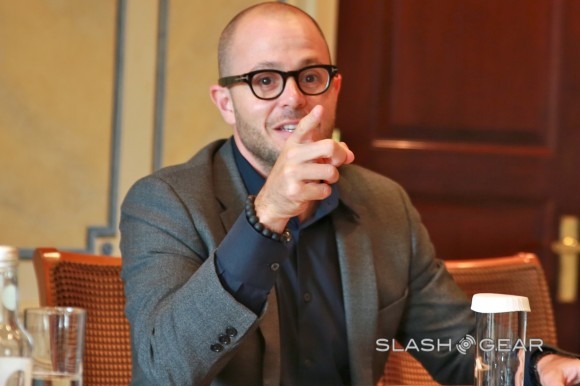
[Q] I was curious about the Weyland TED talk, which was brilliant, and the only sort of un-made-up part for Guy Pearce. Is that where that came from, the idea to sort of...
[RS] We were deeply into the movie.
[DL] Yeah, we... there were a couple of things.
[RS] The dream idea, in hypersleep.
[DL] Right, so, originally in the draft there's a scene in the movie where we see David and he's got his headset on and he's talking to someone, and we don't know who it is, and he gets confronted by Vickers. There's a scene in the script that we decided not to shoot, where we see the inside of that dream, and basically David takes a jetski out with a beautiful woman in a bikini, to a yacht, and on the yacht is Weyland. Played by Guy, without old-age make-up: this is his dream. And they have a scene together, and in that scene David says "the engineers are dead, they're all gone, mission failure" and Weyland says "go back and try harder." And we rewrote it so that we were going to play Weyland's identify closed, give the audience a sense that [David] was talking to someone on the ship but not view them.
But we had already shot the scenes with Guy in the old-age make-up. So we were, like, people are going to wonder why we cast Guy Pearce to play an old man, unless we represent him as Guy Pearce. And that basically tapped into a piece of viral we had already been talking about, which is... I said it would be really cool to introduce the title of the movie – because people were asking "Prometheus, what is that?", "how does the myth have context in the context of this movie?" So I was, like, we should write this TED talk, and then Ridley basically handed it off to Luke, his son, who is an incredible director, and we got together with TED – this guy Tom Rielly over at TED – we called him up and said "can we use your branding?" because if we can't call it a TED talk we'll have to call it a "FRED talk" or something, and everyone will know, it'll cheapen it.
And they said not only can you use our branding, but we'd like to unveil it at TED, and portal it through our website. And so suddenly we realized we were onto something. And of course these things... cool viral doesn't happen unless the director completely and totally gets it, and Ridley's entire background is in advertising, marketing, his brain works that way. So he made the calls to Fox, Fox immediately understood it, and got on board with that and a number of other... they were, like, "what else do you have?" which a studio almost never asks you.
[RS] They usually say, "we've done that!" But actually you haven't. "No. We do that!"
[DL] So Guy was game, and he did it.
[Q] Were there any other viral ones that you had made up, because we saw the one with Noomi as Shaw.
[RS] That was her screen-test. It was part of her screen-test, and then Johnny Hardstaff did the David one, and also played around and took the Noomi application for the job to an eye in the wall – not talking to Mr Weyland, she'd never meet Weyland, never be allowed to, wouldn't even meet the secretary, it's like a HAL eye, she's applying to a job to the eye, which in turn is being watched by a minion, who gets a secretary, and finally get Rupert Murdoch, and finally to actually Weyland.
[DL] So yeah, it was those three pieces of viral: the David 8 ad, which Johnny Hardstaff did, and the Weyland TED talk, and then the quiet eye with Noomi. And then there was one other piece, which was going to be the transmission, that we ended up not doing. It's in the movie.
[RS] We may use it in the US next week. They don't open for a week.
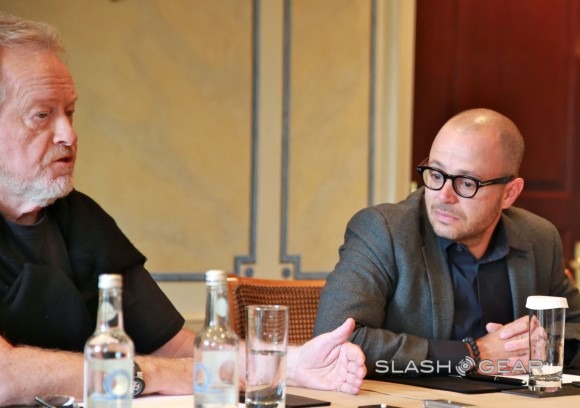
[DL] So there's basically... there's a message in the movie that they're transmitting to the engineers, with the girl playing the violin, and David and Holloway have the scene where they haven't responded to the message. That message is another piece of viral which we may or may not release.
[RS] Did you get what the message was about? [It was a message to the engineers.] That would be a constant, from takeoff you'd be constantly replaying that, hoping that somebody's gonna say "don't come any further, I'm gonna to blow you out of the sky." In there, there would be every conceivable form of mathematics equation, and anyone who is superior is going to look at that for three seconds and say "we've got chimpanzees on the way." So, it's an assessment of who's coming, basically, it makes sense.
[Q] Is that a reference to the original Voyager probe, which obviously had Bach records, drawings, that kind of mix...?
[RS] Yeah.
[DL] Yeah, from like, in Starman.
[Q] One question about the science ... The super-weapon that the engineers have been creating seems to me to be working in two different ways: you have the first way, which is what happens to Holloway, which is that he becomes mutated himself immediately. It's that real-time altering of his genetic code. But then you've got what, in terms of science of the moment, seems the more credible way, which is the way that the mutations are passed down to Shaw's "child", this alien that she's giving birth to. Was there meant to be that contrast between those two?
[aquote]Religion creates more problems for us than any other single thing[/aquote]
[RS] No, not necessarily. The man at the beginning, the person at the beginning, if we are created by gods or monsters – there's no gods, it'd be singular, there'd be one god, probably, because every religion today (which creates more problems for us today in the entire global system than any other single thing, is religion, right) they're all actually worshiping one dude, really. I don't give a damn whether it's, y'know, muslim or you name it: it's theoretically, in theory, one person. I believe that we were pre-visited. I think it's entirely ridiculous to think that four billion years, nearly four billion...?
[DL] Since the Earth was created? Yes.
[RS] Nearly four billion years. I don't know whether it was Updike or the other guy said, a great quote, we've been here four billion years, what happened? Why did it take so long? Nothing's happened 'til until about 750,000, which... 750,000 years in four billion is a blink. I don't really believe... well, there's two rules of thought. You're either going to believe in the fact that we're by entirely genetic luck, so from day one where you have atomic storms – inconceivable storms that will go on in this nucleus, in which the dirt bowl will find some reason to start growth on everything – was that created? That may have been accidental, because I think there are many of those out there.
But then the idea that, is there a higher force in the universe, comes the question: is it god, or are there superior beings out there? You stand and look at the stars at night in the galaxy out there, it's entirely ridiculous to believe that we are it. You mean this is it? We're sitting in this room, I've got this f*cking cappuccino, and up there there's no-one else? I don't think so!
[DL] This is referred to as the "F*cking Cappuccino" theory of astrophysics.

[RS] The astrophysics gig... I've had nine very high-end scientists sitting at a table, ranging from NASA astrophysicists, I don't know what you call a serious mathematician, but a serious mathematician at a scientific level. And I've said, first question, "who believes in god?" And it's a bit like looking at a bunch of nine kids and saying "who masturbates?" There's a total silence.
[DL] Then you get arrested.
[RS] [And one guy says "I believe"] I said, so that's bizarre, it's a weird problem, because "I'm a believer in distilled facts to get me through my day, because I'm in science. On the side, I believe in this guy up there, standing on a cloud with a beard, who actually is my god, which is entirely mystical. So I have a split brain in intention." And he said "Yep!"
[aquote]Were we created or was it God?[/aquote]
So I said, when you meet your wall, having a bad day or a bad month: 18 months you've been working on an equation, you can't get through whatever that equation is, what do you think? Are you thinking "this son of a b*tch is really clever, and I can't break through the barrier", do you think of god then? He said, "yeah, in simplistic terms, yes, could be." So when you start there, that was – far as we're concerned – the right to then start doing fiction, doing movie entertainment, to step out and say "were we created or was it god?"
And therefore there's two questions in the film: the guy at the beginning is simply donating himself, no stranger than the Aztecs or Incas would choose some poor bugger, at the beginning saying "right, you're it, in the year you get all the girls you want, all the food you want, blah blah, and at the end of the year we're going to take your heart, take it out, squeeze it, and we're going to get jolly good crops and good weather next year." It's no more than that, he's into a form of donation, except his DNA is so powerful, each molecule is like a timebomb. So, we only set our standards by what we know here, which makes us essentially naive. We don't, we can't conceive of galloping DNA: I release that on the desk, and in a second I've got a cotton wool ball going black. We can't conceive that because it's not in your frame of experience. So you've got to take your brain, put it on the side, and when you enter the movie just let yourself breath.
[DL] I think another version of your question could be interpreted as "What does the black goo do?"
[RS] Three things! Cleans your teeth...
[DL] [Laughing] Exactly! And I think that one of the things that I love about Ridley's movies, and have loved long before I worked with him – and it's very surreal to be on the inside of – thirty-some odd years after Blade Runner we're all still talking about whether or not Deckard is a robot. So there's a speculative part of it, so the question becomes "what does the black goo do?" That is the question that you're supposed to be asking coming out of this movie. The movie demonstrates what it does in certain circumstances. So, here's what it does if it gets on worms; here's what it does if it gets on your face; here's what it does if someone just puts a little bit of it in your drink. So, now we see that that lots of this is headed to Earth. Now, you used the word "weapon", you're extrapolating that based on the theory [Prometheus captain] Janek has, because it looks like a payload to him: all these ships are loaded with this stuff, and they're headed for Earth. The intent has to be to wipe us out, or is it to evolve us, or is it for something else?

These are all hopefully questions and points of debate – frustrating for some – but ultimately the kind of science-fiction... why the two movies that Ridley did decades ago are still being discussed, is this idea that when you walk out of the theater that you have to go into community and start to discuss "well, wait a minute, this is what I think happened," and you're hopefully mirroring the conversation that the characters are having in the movie, and more importantly this is why Shaw says what she says at the end of the movie. Which is, "I'm not going back to Earth and calling it a day, I need to know a little bit more about what's happening here."
The ultimate goal of Prometheus, usually prequels, or movies that precede the original, close down the universe – so now we know everything we needed to know about Anakin Skywaker – we wanted Prometheus to open up the universe, so it's not a prequel at all. It has two children, one of those children grows up to be Alien, and the other child is hopefully growing up in this other direction and, god willing, will grow up into an entirely different line of films.
[RS] And by the way, that black stuff is terrific Viagra.
[DL] Toothpaste, now Viagra...!
[RS] You have a meltdown next morning!
[Q] All of this is very, very broad, but a lot of your movies have very specific scenes: in this movie, the medpod sequence, in Hannibal the brain-eating sequence. What is the importance of those scenes for you, in addition to asking all these broad questions, having something that's so specific, and horrific?
[RS] I'm a sick f*cker. No, it's a challenge of, say, the John Hurt scene where I read the script and it was told in no uncertain terms by Dan O'Bannon and Ron Shusett that, it's not subtle [mimes reading a script]: "Wow, what the f*ckin' sh*t is coming out his chest?! Holy sh*t, it's a worm!"
[aquote]Where's he going to give birth from?[/aquote]
So, I'm going, "that's disgusting." But actually it was the crossroads of information in the play which this had to be. Where's he going to give birth from? I can think of other places, but it's gonna be less attractive. For it to burst out of his chest was a gobsmacking, shocking experience, and my thought was always "he's gonna split sinew, bone, and separate the ribcage into a birth." That's what the birth is. So when the engine, when the storyline insists – because the good engines insist – when you get moving on a track like that, you know you're kinda onto something. You don't want to change it.
That's why I think dropping that stuff in earlier, [Shaw] saying "I can't conceive", was absolutely the right, perfect thing to do. Which then, after that – because they then relate to each other, consummate, and the following day by god she's pregnant – once she's pregnant, I have to see it, I have to see what that is. And because it's extreme, galloping DNA, whatever that is that's creating this monstrous thing growing inside of her – he says "you look three months pregnant"; in 25 minutes she now looks eight months pregnant – that's inconceivable for us, because we don't understand it. But I think it's probably way up there somewhere, it's entirely feasible. You've got to show it, you've gotta do it.
[Q] I wanted to ask about the special effects. Obviously, when you made the original film it was all models and matte paintings; things have improved dramatically since then. Could you say something about the difference between creating the two?
[RS] You know, the original Alien is still pretty bloody good. I'll show you a huge print in IMAX right now, you'll be shocked: the backgrounds, the universes, were a guy with a toothbrush who does that [mimes flicking the bristles], and goes "how many do you want?" And I say, "well, just do it" and he goes [flick] with the toothbrush, and splatter and speckle onto this shiny black screen, onto the artwork.
[DL] And that was for the stars.
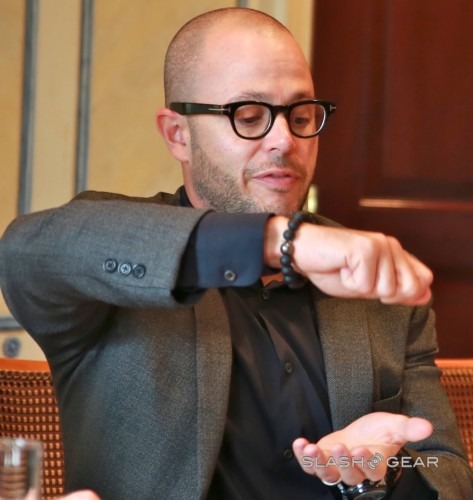
[RS] That was it. The beginning of the movie is flat artwork; he splattered and drew in the... it's flat! You just pan across the flat, into the universe. I'm a camera operator, I operate the whole thing – there's one camera – I'm on the dolly now, we get wind machines, storm, sh*t, filth, okay, of course blowing straight up at me, and I've got a mask on and all that sh*t. And I'm looking through, and I've got dolly-grips behind me on two scaffold poles, which are the actual tracking lines, and he's walking round saying "action!" and I'm saying "stop, backup, I can see the way you're walking." So that's how it was all done, and when you look at it, it's pretty good. The sets are fantastically good, and the lighting was beautiful.
In the funny kind of way it's a lesson: in Blade Runner, those backgrounds, the cityscapes when he's climbing around the side of the building, you can see they're paintings but they're really quite good. Today, you'd never even attempt to do that, you'd sample architecture and drop it in, on absolute lens and perspective so it's absolutely seamless, there's no join. But in those days it was hand-painted. And it's a big lesson, because really, the most important, significant thing in all films – I don't give a sh*t whether it's science-fiction or a western or whatever – it's the goddamned screenplay. Get the screenplay right, and all this technology enhances it. But when the screenplay is week... the technology is the means to the end, the screenplay is the end. And if you get that right first, the rest is relatively straightforward.
[aquote]I'm just going to say it flat-out, the stories mostly are pretty sh*t[/aquote]
But consequently the hardest single thing to do is get it on paper, and that's why today there are many, many more movies being made than, say, twenty years ago, and I'm just going to say it flat-out, the screenplays mostly, the stories, are pretty sh*t. And that's why people who are coming, they yearn for better content. Now we've got primetime television, in England, running a Scandinavian show called The Bridge. I've watched nine hours of it. It's subtitled – primetime British TV. What does that tell you? Massive audience has built up because it's good, great characters... And it's gradually going to shift into movies. At the moment we're still getting away with it, but I think people are getting impatient, particularly in what I'd call the majority part of the world – which is now two-thirds of the world audience – which is everything outside of the domestic market, i.e. everything outside of the US. So it's what the story... get the story right!
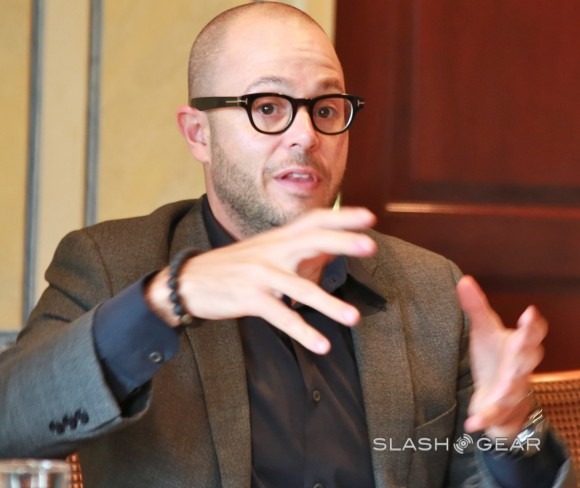
[DL] I would just add to that, very briefly, from the outside looking in, I was really impressed when I came to the set by the commitment to practical. While I was here they shot the scene in the lab where the head explodes, and they were taking off the elephantine helmet, and there's the head in there. And I was like, wow, you're not doing this CG? And Ridley said "no, we're just gonna blow that f*cker up." And I looked over and saw the 7.5 foot tall actor who basically played the engineer, over in makeup, and I said "where are his mocap dots?" "No no, that's what we're gonna shoot?" And I do think that there's a tremendous temptation – there might have been some vis-effects on his eyes, and obviously we did not make the actor disintegrate down to the genetic level – but I do think that very few directors will say, like, what parts of it can we shoot practical, because anybody will come forward from vis-effects and say "we can do the entire thing for you."
[aquote]The voracity of it bleeds through[/aquote]
But our brains are very sophisticated, and we know the difference between what's real and what's fake, especially if you're doing a level of grounded science-fiction, especially about "we came from them", your brain will essentially say "but that's a CG being, it doesn't exist, it's not real, there's not a man in there, anywhere, even if it's mocap." And I think that those decisions, and the commitment to "can I make it the same way that I made it thirty years ago, just because I don't have to any more," I just admire it tremendously, I think it's a huge lesson to be learned and the voracity of it bleeds through.

[Q] In that context, did you see 3D as a challenge?
[RS] It was really straightforward. The idea of 3D being useful to this kind of subject is absolute, and the fact that if I get a camera man like [cinematographer] Dariusz Wolski, and I'm pretty good at knowing what I want, visually and everything else, by the time you put the two of us together, it was pretty straightforward. We shot this in 82 days. Shooting 3D, editing 3D, and it comes out in 3D: it's not a problem.
Problem is, you get a screen, and in the screen you have something hanging in the foreground. And you have a f*cking committee of forty people – including the leading actor – saying whether or not to show what's there or not. I say, "I hate 'em, get rid of them," or "I'll leave them, f*ck off." And that's it, because otherwise you have a long conversation about this. It's bizarre! You've gotta know what you want.
Don't forget to check out our interview with Damon Lindelof and co-writer Jon Spaihts for more on Prometheus' challenging conception, as well as our full review of the new film!
